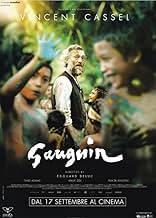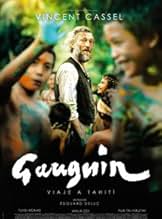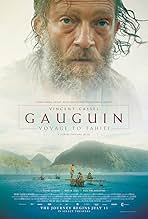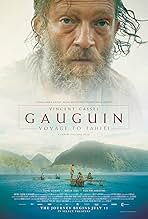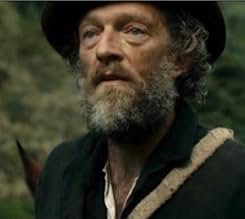IMDb-BEWERTUNG
6,0/10
2543
IHRE BEWERTUNG
Füge eine Handlung in deiner Sprache hinzuFocused on French painter Paul Gauguin's affair with a younger lady in Tahiti.Focused on French painter Paul Gauguin's affair with a younger lady in Tahiti.Focused on French painter Paul Gauguin's affair with a younger lady in Tahiti.
Teiva Monoi
- Onati
- (as Teiva Manoi)
Empfohlene Bewertungen
The story is simply flat and boring. There's no climactic moments, only perpetual dullness. Even the locations of the films do not seem beautiful, which does not do Tahiti justice. It isn't enticing to look at a very unkempt protagonist either. I was thoroughly bored by this film.
Paul Gauguin has had enough of married life, of France and of misery. In the hope of a healthier and more authentic life, the painter moves to Polynesia. An opportunity for him to develop his style and become an artist with an inimitable touch. There, he also falls in love with the beautiful Tehura. The earthly paradise seems within reach...
On the plus side, a very decent reconstruction of the period, beautiful views of Tahiti and Vincent Cassel's rough but intense interpretation. On the other hand, the watering down of the subject is pretty hard to swallow. The girls (not the girl) with whom Gauguin slept were under the minimum age allowed by the law (which is not the case of the pretty actress Tuhei Adams, eighteen at the the time of filming); as for the disease that struck the artist, it was syphilis, not diabetes. It is not by embellishing things that one captures the truth of a human being.
On the plus side, a very decent reconstruction of the period, beautiful views of Tahiti and Vincent Cassel's rough but intense interpretation. On the other hand, the watering down of the subject is pretty hard to swallow. The girls (not the girl) with whom Gauguin slept were under the minimum age allowed by the law (which is not the case of the pretty actress Tuhei Adams, eighteen at the the time of filming); as for the disease that struck the artist, it was syphilis, not diabetes. It is not by embellishing things that one captures the truth of a human being.
Gauguin: Voyage to Tahiti
Gauguin: Voyage to Tahiti is aptly titled.
It's a pity the pace slowed.
Gauguin: Voyage to Tahiti is not a particularly bold film. Nevertheless, it is a film about a very bold person who escapes his bohemian life and introduces a bit of bohemia in the extremely relaxed nation of Tahiti.
I am unsure about the true nature Gauguin. The first part of the film seeks to present him as a man that was abandoned by his wife and family before their planned voyage to Tahiti. In return, he abandons them and lives a life of mild debauchery in a hut by the beach in Tahiti. I presumed the film was a little easy on Gauguin here; he seems to hit the ground running when he arrives and soon forgets his rather laborious family.
The film then obeys a common narrative of a man dealing with a midlife crisis by throwing himself into an affair with young girl - Tehura (a tribal Tahitian offering).
While the script may disappoint; the casting, performances and cinematography are all superb.
Gauguin might be selfish and possessive, but he certainly has conviction. This is certainly something Vincent brought to the screen superbly.
This film touches on a few similar themes to Jane Campions excellent film 'The Piano'. You could almost consider this film to be The Piano through a male lens.
It's a pity the pace of the film slowed. I couldn't help but feel that there is a better film that could have been made here. Perhaps more of his history in Paris would have created a better juxtaposition on what Gaugin left?
However, Gauguin threw himself into a new life and a new art. This above anything else is the most enticing thing about the film. It may inspire.
Gauguin: Voyage to Tahiti is aptly titled.
It's a pity the pace slowed.
Gauguin: Voyage to Tahiti is not a particularly bold film. Nevertheless, it is a film about a very bold person who escapes his bohemian life and introduces a bit of bohemia in the extremely relaxed nation of Tahiti.
I am unsure about the true nature Gauguin. The first part of the film seeks to present him as a man that was abandoned by his wife and family before their planned voyage to Tahiti. In return, he abandons them and lives a life of mild debauchery in a hut by the beach in Tahiti. I presumed the film was a little easy on Gauguin here; he seems to hit the ground running when he arrives and soon forgets his rather laborious family.
The film then obeys a common narrative of a man dealing with a midlife crisis by throwing himself into an affair with young girl - Tehura (a tribal Tahitian offering).
While the script may disappoint; the casting, performances and cinematography are all superb.
Gauguin might be selfish and possessive, but he certainly has conviction. This is certainly something Vincent brought to the screen superbly.
This film touches on a few similar themes to Jane Campions excellent film 'The Piano'. You could almost consider this film to be The Piano through a male lens.
It's a pity the pace of the film slowed. I couldn't help but feel that there is a better film that could have been made here. Perhaps more of his history in Paris would have created a better juxtaposition on what Gaugin left?
However, Gauguin threw himself into a new life and a new art. This above anything else is the most enticing thing about the film. It may inspire.
Some good moments in this story of Paul Gauguin and his Tahitian period, emphasizing his relationship with Tehura, but mostly I found the film overly
self-indulgent, and narcissistic on the part of the film creators. I am a bit critical on the subject since Gauguin is my favorite Impressionist, more brilliant in my mind than Vincent. If it had been tighter, with less stream of consciousness and more emphasis on the narrative it would have been more effective. Paul Gauguin has been played by George Sanders (as "Strickland" in Maugham's The Moon and Sixpence) Anthony Quinn, David Carradine, and now Vincent Cassel. All good in their way, each capturing elements of the artist's personality. Surprisingly, of all the actors to play Gauguin David Carradine gives the best performance. Find it if you can in another so-so try at capturing this story, Gauguin the Savage.
"Gauguin: Voyage to Tahiti" is a Biography - Drama movie in which we watch Paul Gauguin leaving from Paris in 1891 to go to Tahiti leaving behind his wife and his five children. He finds happiness in a young native girl and he continues his life.
I liked this movie because it was simple but not boring and followed the life of Paul Gauguin and it is based on true events. The interpretation of Vincent Cassel who played as Paul Gauguin was very good and he did his best to adapt on this role. Another interpretation that has to be mentioned was Tuheï Adams who played as Tehura. In conclusion, I have to say that "Gauguin: Voyage to Tahiti" is not a masterpiece and many things could be better and be presented with a little bit more information such as Paul Gauguin's life in Paris and how he was known there. This could help us understand his choices and his personality even better.
I liked this movie because it was simple but not boring and followed the life of Paul Gauguin and it is based on true events. The interpretation of Vincent Cassel who played as Paul Gauguin was very good and he did his best to adapt on this role. Another interpretation that has to be mentioned was Tuheï Adams who played as Tehura. In conclusion, I have to say that "Gauguin: Voyage to Tahiti" is not a masterpiece and many things could be better and be presented with a little bit more information such as Paul Gauguin's life in Paris and how he was known there. This could help us understand his choices and his personality even better.
Wusstest du schon
- WissenswertesWhen Paul Gauguin met Teha'amana (also called Tehura), she was 13 and he was 48. They had a daughter that lived only few days a year later.
- VerbindungenFeatured in Stupéfiant!: La folie Gauguin (2017)
Top-Auswahl
Melde dich zum Bewerten an und greife auf die Watchlist für personalisierte Empfehlungen zu.
- How long is Gauguin: Voyage to Tahiti?Powered by Alexa
Details
- Erscheinungsdatum
- Herkunftsland
- Offizieller Standort
- Sprachen
- Auch bekannt als
- Gauguin: Voyage to Tahiti
- Drehorte
- Tahiti, Französisch-Polynesien(place where Gauguin emigrates)
- Produktionsfirmen
- Weitere beteiligte Unternehmen bei IMDbPro anzeigen
Box Office
- Bruttoertrag in den USA und Kanada
- 200.140 $
- Eröffnungswochenende in den USA und in Kanada
- 35.994 $
- 15. Juli 2018
- Weltweiter Bruttoertrag
- 3.389.322 $
- Laufzeit
- 1 Std. 42 Min.(102 min)
- Farbe
- Sound-Mix
- Seitenverhältnis
- 2.35 : 1
Zu dieser Seite beitragen
Bearbeitung vorschlagen oder fehlenden Inhalt hinzufügen



